Ben's Year in Film: Reflections and a Top Ten
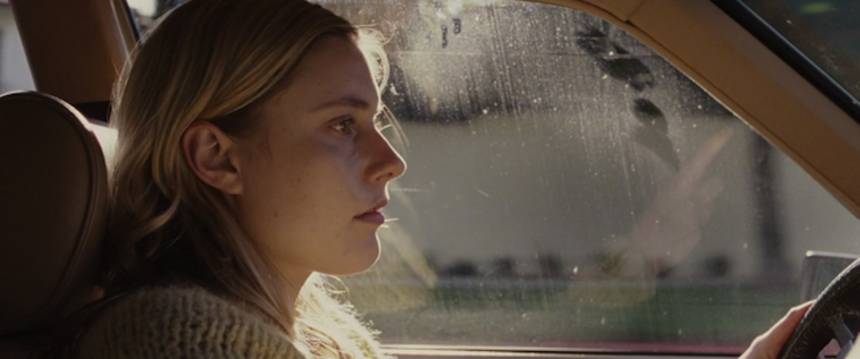
In all likelihood the films on this list will still be my favorites five years from now precisely because they were the ones I saw in 2010: the ones I associated with from day to day like new friends who already feel old; the ones that gave me perspective on my own life when I wasn't even looking for it; and the ones that haunted and hounded me so persistently that I had to share with others out of a maddening enthusiasm for them. These were the films that kept prompting me to ask the question, "what does cinema mean to me?"
And some of my best cinematic outings didn't even come from watching recent flicks. I'll fondly look back on the evening fellow ScreenAnarchy writer, Dustin Chang and I saw Kurosawa's Dersu Uzala at the Film Forum. Two good friends going to see a movie about friendship - what more could one ask for? How about seeing Bill Forsyth's Gregory's Girl (Probably the funniest movie I've ever seen outside of Ghostbusters) with a sold-out audience. And in the row in front of me: a very enthusiastic dad and his ten year-old son who was seeing the movie for the first time. I smiled and thought, "If I ever have kids..."
The Red Riding Trilogy didn't make it to the top ten, but man, will I never forget the epic six-hour press screening last January. It was not only a totally enthralling experience seeing all three parts of the Yorkshire set crime trilogy back-to-back-to-back, but also one of my first forays into the strange, labyrinthine world of the film press; a world made of equal parts optimism and cynicism. No more did I get a taste for my elder colleagues than at the Tribeca Film Festival later that spring. The curious kid in me was amused by the old guard critics' disposition to complaining and the hipster blog upstarts post-ironic waxing. I thought, more uncomfortable now than anything, "where do I fit in?"
It was over the summer after the always wonderful New York Asian Film Festival that I seriously began to question what being a film journalist - whether amateur or professional, paid or unpaid - meant to me. How it affected me as a filmgoer, as a lover of cinema, and in many ways also as a filmmaker (of which I am at least by training). At times there was a disruptive quality to these proceedings; the need to write a review, to critique (and the anxiety that could come from such) or to be a good boy for the publicists; That analytical nausea trumping the magical and intrinsic, was kind of more than a little scary to me.
Most of the time though I walked into a screening cold, not knowing a thing about the film I was going to see beyond its title. At that moment, in the dark of the theater, all that muckity angst melted away; I was there, present, ready and willing for what could come next. And more often than not, magic, pure, unadulterated magic happened.
The last quarter of the year did not see me running from my day job to a posh little screening room in SoHo for the latest Ken Loach, or meeting friends to catch a retrospective at BAM or MoMA. As of late the majority of my viewings has come in one of the most shameful ways I can think of for a cinephile - on my laptop. Via Netflix.
C'est la 21st century vie.
So, whether theatrical or home viewing, at a festival or on instant watch, these are, for the moment, and in alphabetical order, my favorite films of 2010:
Black Swan (Darren Aronofsky)
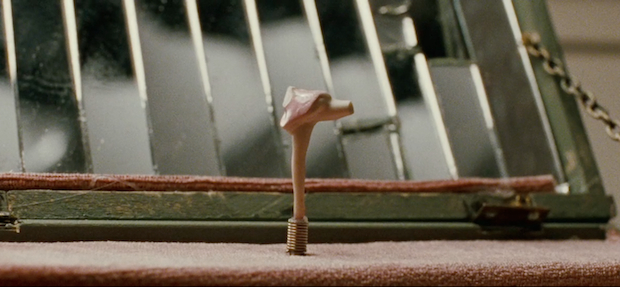 Twenty years from now the general consensus could be that their bombastic ballet picture was not only a cumulative effort for Aronofsky and Natalie Portman, but also the film that herald a creative catharsis for both director and star.
Twenty years from now the general consensus could be that their bombastic ballet picture was not only a cumulative effort for Aronofsky and Natalie Portman, but also the film that herald a creative catharsis for both director and star. Not even 30, and Portman has already had a long and much scrutinized career. My own feeling has been that outside of her raw debut as a child in Leon: The Professional, and perhaps her role in Closer, she's been an actress where you can usually see the acting; not usually a good thing...
Aronofsky for his part is at a point in his career where he is able to contextualize his actors perfectly with subject matter, conducting to their strengths like a grand master, whilst giving them the courage and freedom to be challenged. This is what he gives Portman, and she meets it head-on with a new-found audacity, equally thrilling and terrifying to behold.
Art as life. Greatness through madness. This is Black Swan.
Eccentricities of a Blonde-haired Girl (Manoel de Oliveira)
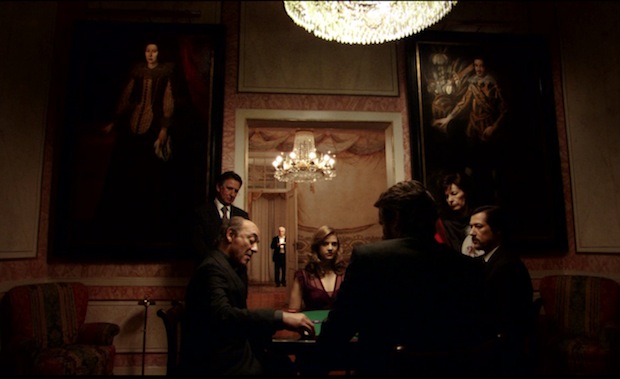 Quaint and elegant, baroque and somehow noir-ish in presentation, this film from the world's oldest working director acts as a fable, and what fable wouldn't be complete without a bittersweet love story right at its core? At just over an hour it is an amusing and easy viewing for the curious, and an absolute goldmine for cinephiles seeking something a little bit more classical in aesthetic.
Quaint and elegant, baroque and somehow noir-ish in presentation, this film from the world's oldest working director acts as a fable, and what fable wouldn't be complete without a bittersweet love story right at its core? At just over an hour it is an amusing and easy viewing for the curious, and an absolute goldmine for cinephiles seeking something a little bit more classical in aesthetic. So, when I said noir-ish in presentation... Sabine Lancelin shoots like a cinematographer prone to noir pictures, but has decided to go on holiday to paint romantic era portraits by the seaside. Rich in texture, and simple in design it was the most visually enchanting picture I saw in 2010.
Everyone Else (Maren Ade)
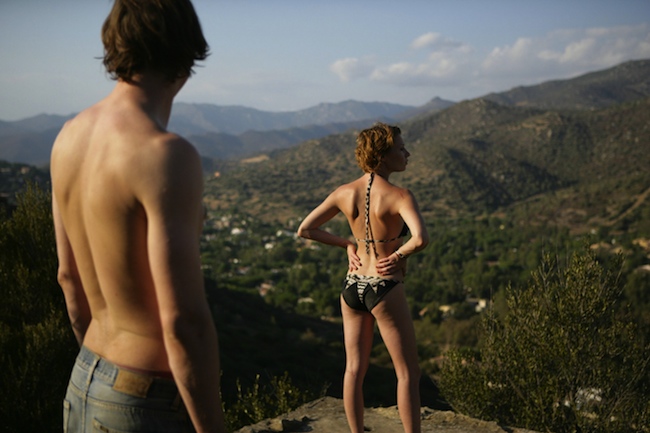 There is a very telling moment early on in Ade's second feature: Birgit Minichmayr's Gitty shows her boyfriend's young niece how to mock-shoot her. The little girl says, "I hate you," and with a moan, Gitty is hit by the child's imaginary bullet, and stumbles backwards into their vacation home's pool. Funny and awkward to the point of embarrassment, Chris (Lars Eidenger) stands at the edge of the pool watching his girlfriend float on her belly, playing dead. As much as they need a vacation, his anxieties are with work, an architecture competition, and at all costs avoiding a colleague who also happens to be staying in the same Mediterranean town as them.
There is a very telling moment early on in Ade's second feature: Birgit Minichmayr's Gitty shows her boyfriend's young niece how to mock-shoot her. The little girl says, "I hate you," and with a moan, Gitty is hit by the child's imaginary bullet, and stumbles backwards into their vacation home's pool. Funny and awkward to the point of embarrassment, Chris (Lars Eidenger) stands at the edge of the pool watching his girlfriend float on her belly, playing dead. As much as they need a vacation, his anxieties are with work, an architecture competition, and at all costs avoiding a colleague who also happens to be staying in the same Mediterranean town as them.What Ade and her actors bring to a seemingly familiar story is that rare mutability of life, of a relationship, where the nature of each moment houses many truths. Everyone Else is a tender film without being sentimental, a painful one without being hurtful. And if Ade's first feature The Forest For the Trees wasn't indication enough, it is the arrival of an astute observer of human nature sans the blunt commentary, and with more than a hint of everyday strangeness.
Golden Slumber (Yoshihiro Nakamura)
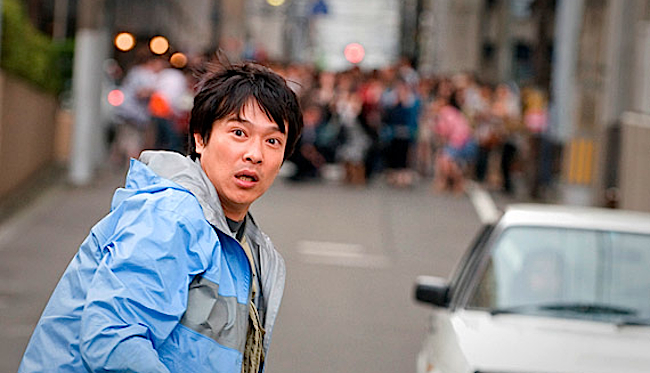 Here we have a conspiracy-based thriller that on paper sounds incredibly, perhaps dangerously, nostalgic. As a film up on screen it is probably still this, and is also wildly entertaining. Think if Frank Capra directed The Bourne Identity, only well this is from Yoshihiro Nakamura, the man who wowed festival audiences last year with the enduring Fish Story. And Golden Slumber is also a hell of an enduring picture thanks to Masato Sakai, who plays our clueless hero that is roped into being the scapegoat - "the Lee Harvey Oswald" if you will - of an insidious plot to assassinate Japan's Prime Minister.
Here we have a conspiracy-based thriller that on paper sounds incredibly, perhaps dangerously, nostalgic. As a film up on screen it is probably still this, and is also wildly entertaining. Think if Frank Capra directed The Bourne Identity, only well this is from Yoshihiro Nakamura, the man who wowed festival audiences last year with the enduring Fish Story. And Golden Slumber is also a hell of an enduring picture thanks to Masato Sakai, who plays our clueless hero that is roped into being the scapegoat - "the Lee Harvey Oswald" if you will - of an insidious plot to assassinate Japan's Prime Minister. Golden Slumber's off-beat nature balloons with its colorful cast of supporting characters, including a serial-killer turned sidekick. What grounds the picture is a flashbacking storyline about Sakai and his college friends, including his cute romance with the now married Yûko Takeuchi. How this all weaves together in present day is mind bogglingly loopy, yet it works. It works like gangbusters. A total unabashed delight about deep human connection in our wi-fi world, Golden Slumber is a film that will get the adrenaline pumping as much as it will tug at the ol' heart strings.
Greenberg (Noah Baumbach)
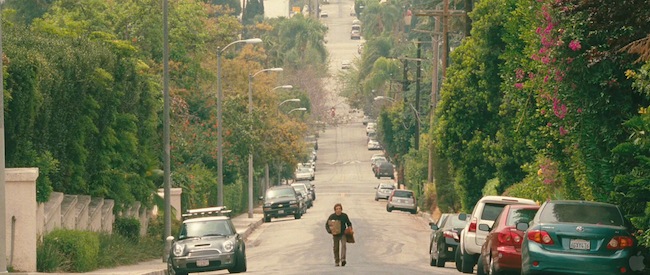 I like Noah Baumbach films. A lot. Many folks who saw Greenberg seemed to think the title character played by Ben Stiller was a dick, a jerk, a narcissistic asshole. I didn't see it that way. I read him as vulnerable at the very best and misanthropic at the very worst. And I identified with him, empathized with him. Quite a lot.
I like Noah Baumbach films. A lot. Many folks who saw Greenberg seemed to think the title character played by Ben Stiller was a dick, a jerk, a narcissistic asshole. I didn't see it that way. I read him as vulnerable at the very best and misanthropic at the very worst. And I identified with him, empathized with him. Quite a lot.And Greta Gerwig may be the one good thing to come out of the so-called mumblecore movement. I recently had a conversation with a friend who said he thought her performance was flat, and then re-worded it as understated. He didn't think there was much of a difference between the two. In my mind there is a big difference, however fine the line. Like Greenberg, Gerwig's Florence, is a hard one to pin down: a people pleaser full of self-doubt, constantly flustered but never angry. If I was in any position to vote for a best actress award this year I'd give it to Greta Gerwig.
I'd gladly welcome the chance to sit with these characters for several more hours, digging wholeheartedly into the awkward minutia of their lives, and that's probably one of the greatest compliments I could give any film.
Live Tape (Tetsuaki Matsue)
 If someone were to put a gun to my head and force me to name my absolute favorite film of 2010, I might end up saying Greenberg, but if I were asked what film I'd wholeheartedly recommend everyone see it'd probably be this 74 minute concert film shot entirely in one take. Only I don't really know how one would procure it outside of Japan.
If someone were to put a gun to my head and force me to name my absolute favorite film of 2010, I might end up saying Greenberg, but if I were asked what film I'd wholeheartedly recommend everyone see it'd probably be this 74 minute concert film shot entirely in one take. Only I don't really know how one would procure it outside of Japan. Up and coming documentarian Matsue follows musician Kenta Maeno as he strolls the streets of Tokyo on New Years day 2009, plucking his guitar, singing wistful ballads, he's a glum-hearted minstrel in ray-bands.
Trying to encapsulate this film is actually really hard... it is a simple idea, seamless in execution, organic, of its moment yet most likely meticulously planned... as I stumble through a way to describe the film in any lasting detail, I think of how Live Tape epitomizes that pure cinematic magic I spoke about earlier. There is something miraculous happening in its ambling and spontaneous nature. Matsue begins to poke and prod Maeno with playful jokes about hiding behind his sunglasses, all the while hiding behind camera himself. Before the film ends with a beautiful sunset concert, Matsue steps out from behind camera, and the two men discuss their hardships of the previous year in surprisingly candid fashion. All of a sudden Live Tape becomes a poignant portrait of not just one artist, but of two creative souls finding camaraderie in that deeply personal yet universal struggle to create something wonderful and of themselves. Well boys, mission accomplished.
Monsters (Gareth Edwards)
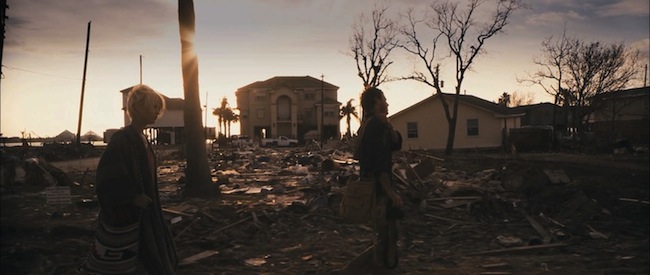 More unsettling than downright scary or flighty, Edwards is a filmmaker who ruminates on the nature of fear rather than cueing it for sensational and primal effect. The moment the extraterrestrial monsters make a full appearance just may be the most beautiful, emotionally engaging moment in the entire picture, and probably not for the reasons one expects. It is this focus on mood, atmosphere and sheer emotional beauty that makes Edwards capable of wowing well beyond his micro-budget effects work, which has gained him entry into the hallowed halls of studio filmmaking.
More unsettling than downright scary or flighty, Edwards is a filmmaker who ruminates on the nature of fear rather than cueing it for sensational and primal effect. The moment the extraterrestrial monsters make a full appearance just may be the most beautiful, emotionally engaging moment in the entire picture, and probably not for the reasons one expects. It is this focus on mood, atmosphere and sheer emotional beauty that makes Edwards capable of wowing well beyond his micro-budget effects work, which has gained him entry into the hallowed halls of studio filmmaking. Here's hoping then that he can bring more than a little of that poetic panache and guerrilla aesthetic to his upcoming big-budget sci-fi flick.
Please Give (Nicole Holofcener)
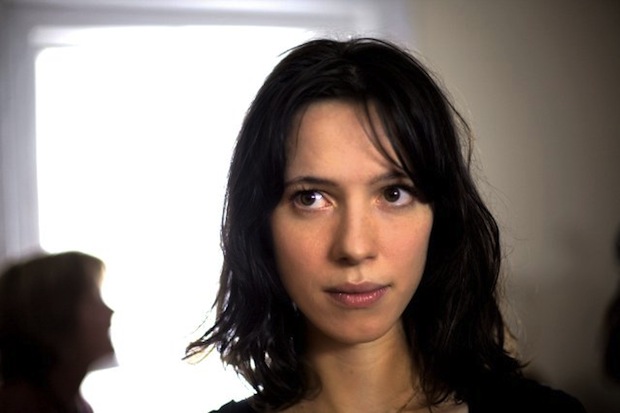 Upper class guilt is the name of the game in this Manhattan set comedy of manners and morals. Catherine Keener and husband Oliver Platt court their elderly neighbor and her granddaughters, waiting for the day the old bag croaks and they can get her apartment renovated.
Upper class guilt is the name of the game in this Manhattan set comedy of manners and morals. Catherine Keener and husband Oliver Platt court their elderly neighbor and her granddaughters, waiting for the day the old bag croaks and they can get her apartment renovated.Rebecca Hall, in her relatively short career has played the damsel-in-distress/victim role a number of times, mostly in testosterone driven fair like the Boston-set thriller The Town. Here, in what may be her most authentic performance, she is a victim of her own family, playing the self-enforced caretaker to her crotchety ol' grandma. There is a quiet, lopsided dignity to her, which plays as an interesting parallel to Keener's anxiety riddled, guilt stricken furniture store owner. People are mean here, and then they feel shitty, and things usually end up in that tricky gray area. With Holofcener's acerbic yet gentle touch Please Give is a very funny and insightful picture on the process of letting go.
Symbol (Hitoshi Matsumoto)
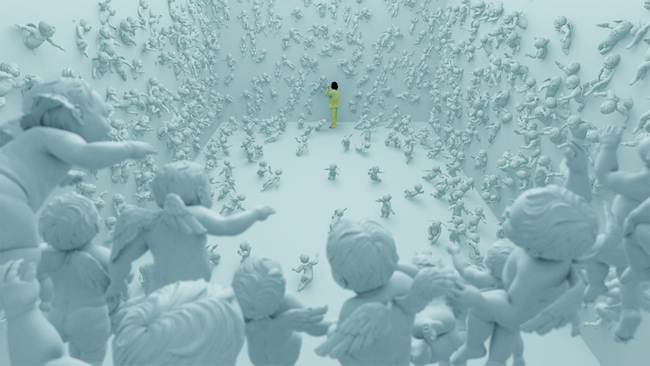 The most profound message film based around potty humor and fart jokes ever made. All brought to you by one of Japan's most prolific comedians, and now with his second feature under his belt, one of the island nation's most intriguing directors. If you're a regular reader of these here pages then you know the praise we've lavished on this film has been nothing short of stellar, so what else is there left to say? Yes, Symbol is essentially one drawn-out joke. And yep, the majority of it takes place in a white room where Matsumoto - looking like a preschooler in pajamas - has to figure out a way to get free of his prison by using items that are dropped after pressing singing penis statues, which magically appear from the walls. That all sounds rather crazy and shouldn't work as a film, yet Symbol most certainly, absolutely 100% does.
The most profound message film based around potty humor and fart jokes ever made. All brought to you by one of Japan's most prolific comedians, and now with his second feature under his belt, one of the island nation's most intriguing directors. If you're a regular reader of these here pages then you know the praise we've lavished on this film has been nothing short of stellar, so what else is there left to say? Yes, Symbol is essentially one drawn-out joke. And yep, the majority of it takes place in a white room where Matsumoto - looking like a preschooler in pajamas - has to figure out a way to get free of his prison by using items that are dropped after pressing singing penis statues, which magically appear from the walls. That all sounds rather crazy and shouldn't work as a film, yet Symbol most certainly, absolutely 100% does.Zonad (John and Kieran Carney)
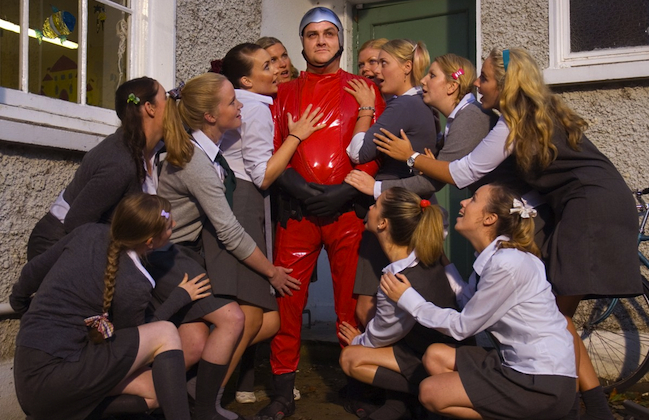 When a man in a red jumpsuit is found passed out in the Cassidy's family room the same night a comet passes over their little Irish hamlet of Ballymoran, they, and the rest of the town's residents, are convinced they have an intergalactic traveler in their midst, only well... it is painfully obvious... that they do not. Thus begins the Carney Brothers utterly zany send-up of 50s B movies and American sitcom tropes.
When a man in a red jumpsuit is found passed out in the Cassidy's family room the same night a comet passes over their little Irish hamlet of Ballymoran, they, and the rest of the town's residents, are convinced they have an intergalactic traveler in their midst, only well... it is painfully obvious... that they do not. Thus begins the Carney Brothers utterly zany send-up of 50s B movies and American sitcom tropes. Simon Delaney as the titular (not) spaceman is a hoot; equally charming and cunning, oafish and lovable he sets the tone for this lewd and also very sweet picture. Janice Byrne as the not-so-innocent Irish school girl and Rory Keenan as her vengeful yet hapless American beau hold their own in the larger ensemble, playing against type. Brian Byrne punches out a rousing tongue-in-cheek score, while the Carneys direct the madness with a lite, assured hand.
I was lucky enough to catch Zonad at Tribeca last spring, but outside of a few further festival dates I've seen hide nor hair of the film, which is a downright shame because this is one of the funniest I've come across in quite some time. I can't see why it would be unable to find a wider audience outside of its native Ireland.
Okay, so that's about it. If you stuck to the end, much obliged.
Here are 20 honorable mentions:
The Blood of Rebirth, Daddy Longlegs, Daybreakers, The Disappearance of Alice Creed, The Eclipse, Exit Through The Gift Shop, Never Let Me Go, My Queen Karo, No One Knows About Persian Cats, Ondine, The Red Riding Trilogy, Sawako Decides, Scott Pilgrim vs. The World, The Social Network, The Square, Toy Story 3, The Travelogues, True Grit, Visionaries: Jonas Mekas and the (mostly) American Avant-garde, Youth in Revolt.
Questions? Comments? Fire away.

Do you feel this content is inappropriate or infringes upon your rights? Click here to report it, or see our DMCA policy.






